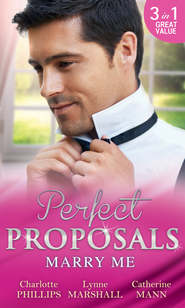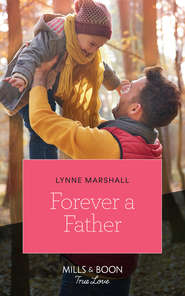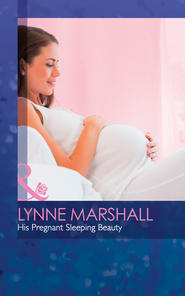По всем вопросам обращайтесь на: info@litportal.ru
(©) 2003-2025.
✖
Dr Tall, Dark...and Dangerous?
Автор
Год написания книги
2018
Настройки чтения
Размер шрифта
Высота строк
Поля
He slowly lifted his eyes, sending her another warning glance.
“Did you know there’s a huge need for the underserved and minimally insured population in this area?” she said, undeterred. “And also, on the brighter side, you could chip away at some of the required hours for your month-long clinic rotation.”
He didn’t give a damn how good a saleswoman she was, he just wanted her to shut up so he could finish his report and get back to the hospital. “Tell you what,” he said. “I’ll give you one whole day to see your clinic walk-in patients. There. You happy now?” May as well take up her suggestion and get this volunteer time out of the way as quickly as possible. Now maybe she’d be quiet.
She tossed him a don’t-do-us-any-favors look before she commenced rushed clicking and clacking on the keyboard.
Yeah, he’d said the words, and they had seriously lacked enthusiasm, but he’d already gathered she was a smart cookie and wasn’t about to let an opportunity like this slip by. Now maybe he could finish this consult and head out.
“I’ll print up a flyer and hire some of the local boys to distribute them to the houses and on cars in the area.”
“Great. Whatever. Now, could you let me finish my report?” That got a rise in her brows, and more speedy typing, as he’d hopelessly lost his train of thought about the wording in the report.
His concentration thrown out of the window, he recalled on his drive through the neighborhood that the boulevard was lined with red-brick and mortar storefronts, and had an eclectic assortment of businesses. Many looked rundown. The place probably could use a day-long walk-in surgery clinic, and the sooner he got his volunteer hours done the sooner he could get back to focusing fully on plastic surgery.
“Maybe you should post flyers in the local business windows, too,” he said. “Though you may want to skip all the mortuaries—don’t want to send the wrong message.”
Quick to forgive, she laughed, and it sounded nice, low and husky. Almost made him smile.
“What’s up with that anyway?”
“The overabundance of mortuaries?” she said. “I think it must have something to do with having a hospital in the area since the late eighteen hundreds and the odds of folks making it out alive.” Unlike him, she could multitask, and never missed a beat typing and staring at the computer screen. “I guess the morticians went where they were guaranteed business. Though it does seem like overkill these days, pardon the pun.”
He nodded, stretching his lips into a straight line rather than a smile, and grudgingly admitted he liked her dry wit and Boston accent. Pah-din. “Yeah, so I figure if I’m volunteering time for the month, like you said, I may as well make it worth everyone’s while.” Code for get it over with ASAP. That’s what he was all about these days—meet his obligations as quickly as possible and move on. In another year he’d get his life back and begin his own private practice back home in California. Besides, he hated it when he ran out of things to do, preferring to work until he could pass out and sleep. Then work more. Anything to keep his mind occupied.
He scratched his jaw. “So I’ll come at nine and work until seven—that way folks can stop by after they get off work,” he said.
“Then why not make it eight p.m.? Would that work? With long commutes, some people don’t get home from work until after seven.”
Sure, squeeze an extra hour out of me, lady. “Fine,” he said, staring at the last dangling sentence in his report.
Truth was, unless he moonlighted, he had nothing better to do with his time most nights. He sublet a basement bachelor apartment near Beacon Hill, with rented furniture and noisy pipes, paid through his nose for the privilege to live there, and after a year had yet to meet a single neighbor.
“That way you’d get half of your required volunteer hours out of the way in one day,” she said.
He wanted to protest, say that wasn’t the reason he’d agreed to do the all-day clinic, but she’d seen right through his tidy little plan. He cleared his throat. “Good point.”
Her fingers clacked over the keyboard again. His concentration shot, he stood, crossed the room and looked over her shoulder at the screen. Within a couple of minutes she’d produced a first-rate flyer, complete with clip art of a stethoscope and all the pertinent information, clear and concise.
“What do you think?” She glanced up, their gazes connected. Up close he was struck by how green her eyes were, and that she was a natural blonde, and he wondered why it registered.
“Looks great,” he said, leaning away while she pressed “Print” and stood.
She walked across the small and cluttered office to the antiquated printer to snag the first flyer. Holding the goldenrod paper like a picture for him to see, she smiled. “Not bad.”
He looked her up and down before looking at the flyer. Yeah, not bad. “Guess I can’t weasel out of it now.”
She rewarded his honesty with a smile, a very nice smile. “Nope. I’m going to hold you to your word. We’ll put one of these by the receptionist’s window right now and start handing them out after lunch.”
As she breezed across the room toward the connecting front office in her oversized lab coat and scrubs, he caught a scent of no frills soap and enjoyed the clean smell, then discovered there was something else he favored about her. Unlike so many of his patients—size four with forty-inch chests—she wasn’t skinny trim. She was sturdy and healthy looking, not like the lettuce-and-cilantro-eating women he saw in the plastic surgery clinics.
“Look,” he said, needing to get away before he discovered anything else he liked about her, or before she bamboozled him into working there the entire month. “I’ve got to run back to the hospital. I’ll see you next Tuesday.”
Kasey hopped off the bus on her street, the rich smell of fresh pizza from the corner ma and pa shop making her instantly hungry. She strode briskly against the chill and drizzle toward her house, eager to take off her shoes and relax. In a neighborhood lined with hundred-year-old two-story houses, most divided into two units, she lived amongst an interesting mix of people: the working class; families and seniors; immigrants; and Bostonians who could trace their American heritage back for centuries. She loved her converted first-floor apartment with hardwood floors and mustard-colored walls, and appreciated her quiet neighbors, except for that constantly squawking cockatiel next door. Skipping up her front steps to get out of the drizzle, which had now progressed to rain, she wondered if spring would ever break through the dreary weather.
After grabbing the mail from the box on the porch, she used her key to open the front door, immediately disabling the alarm system. Sadly, living alone in the city, it was a necessary expense, and one that gave her peace of mind. Well worth the cost.
She tossed her mail on the dining table on her way to the kitchen, and the corner of another letter left opened from yesterday caught her eye and brought back a wave of dread. Try as she may to put it out of her head all day, she’d failed. She needed a cool glass of water before she dared read it again. Maybe the words had changed. Maybe she’d misunderstood.
A quiet mew and furry brush against her ankle made her smile. She bent to pick up Daisy, her calico cat, who’d come out of hiding to greet her.
“What’s up, Miss Daisy? Did you watch the birds today?” She thought how her cat sat perched on the back bedroom window-sill, twitching her tail for hours on end, most likely imagining leaping into the air to catch a chickadee busy with nest-building. “You want your dinner?”
After she’d fed the cat and drunk a whole glass of water, she went back to the table and picked up the letter from the Department of Health and Welfare.
“It is with great sadness we inform you that your birth father, Jeffrey Morgan McAfee, has passed away from Huntington’s disease …”
She tossed the letter on the table, closing her eyes and taking a seat. She hadn’t misread it. With elbows planted firmly on the worn walnut surface, she dropped her head into her hands and did something she rarely allowed: she felt sorry for herself.
“We recommend you meet with a genetic counselor and set up a blood test …”
She’d never known her father, her mother had never spoken of him, and this had been one hell of an introduction. She’d called her mother to verify her father’s name last night, but had only got her message machine. Then later, Mom had called back to break the bad news. He was, in fact, her father. That’s all she’d said, but Kasey intended to get the whole story one day soon.
“Did he leave you anything in his will?” So like Mom. Always looking for a free ride and never coming close to finding one.
“Yeah, Mom, one doozy of an inheritance …”
Kasey wouldn’t wish the progressive, degenerative disease on anyone, yet with her birth father having and dying from it, she had a fifty percent chance of developing Huntington’s. And once the symptoms began, if they began, which was a mind-wrenching thought in itself, there would be a tortured journey of wasting nerve cells, decreased cognition, Parkinson’s-type rigidity and myriad other health issues until it took her life.
At least Mom had apologized, but how could a person make up for sleeping with the wrong guy, getting pregnant, and never seeing him again? Actions and consequences had never really figured into her mother’s style of living.
She couldn’t dwell on the disease. There was no point. While removing her head from her hands, her stomach protested, reminding her it had been hours since she’d eaten. She either carried the marker or she didn’t, the ticking clock had already been set or it hadn’t. Thinking how her ignorance had been bliss all these years, she had no control over anything, and now her life must go on just as it had before the letter had arrived.
She stood, losing her footing and having to grab the table for balance. Could it be an early symptom? Her throat went dry. Hadn’t she been bumping into things more recently? She shook her head, scolding herself. She’d always been clumsy, especially when she rushed, and she rushed all the time at work. There was no need to second-guess every misstep. She needed to eat, that was all.
And if she wanted peace of mind, all she needed to do was make an appointment and have a blood test and find out, once and for all, if she carried the defective gene. Be done with it or face it head on.
She’d been drawing blood from patients for years, never thought twice about having her own lab work done. Not since a kid had the thought of a laboratory test sent an icy chill of fear down her spine. Until today. What would she do if she had Huntington’s? She tightened her jaw and stood straighter. If she had the disease, she’d just have to make the most of each day … until the symptoms began, and even then, she promised to live life to the fullest for as long as she was physically able.
Though her stomach growled a second time, she’d just lost her appetite.
CHAPTER TWO
FRIDAY night, hidden in a booth and lost in the noise of the local Pub, Kasey took another sip of her beer. She’d asked Vincent to join her for dinner, her treat, hoping to work up the nerve to tell him her troubles. So far they’d each had a deli sandwich, hers the chicken breast, his the beef dip, and they’d shared a Caesar salad. Vincent had just ordered a second round of beer, yet she still hadn’t broached the subject etched in her genes and squeezing her heart.
“O. M. G., look!” Vincent pointed to the bar with the neck of his low-calorie beer bottle. “It’s him, Dr. Tall, Dark, and Gorgeous.”
Kasey almost choked on her drink when her eyes focused on the broad shoulders covered in a well-cut jacket, and the trim hips and jeans-clad legs. Though from Vincent’s perspective Dr. Finch might be, she wouldn’t go so far as to call him tall, but somewhere more in the vicinity of five eleven or so. Why split hairs, when the conclusion was the same? The man was a hunk.











